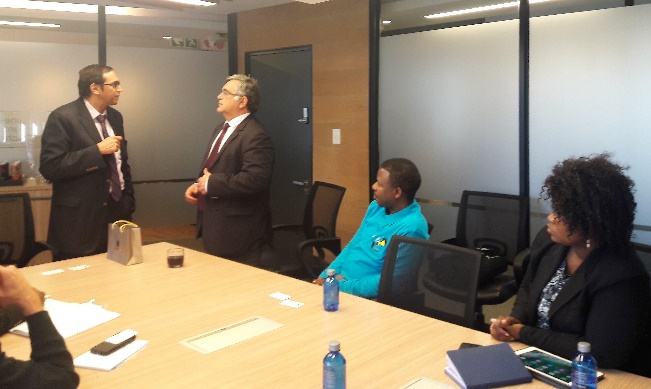ISTC, University of Pretoria Discuss Exchange of Experience, Strengthening Cooperation

.jpg) Pretoria, Astana, 16 August 2018. Representatives of ISTC and the University of Pretoria met in the beginning of August to share information about on-going forms of collaboration in the field of nuclear non-proliferation and to exchange views on future cooperation. Prof. Sunil Maharaj, Dean of the Faculty of Engineering, Built Environment and Information Technology (EBIT) hosted Dr. Kamen Velichkov, ISTC’s Senior Programme Manager and Diplomatic Advisor at the premises of one South Africa’s oldest and most prestigious higher education institutions. Prof. Maharaj was debriefed about the joint work of ISTC and South Africa’s National Nuclear Regulator on the EU-funded, ISTC-implemented project Support to Southern African states in nuclear safety and safeguards (Project MC5.01/15B). The NNR’s Centre for Nuclear Safety and Security – a prime ISTC partner in the implementation of the project – is located at the University of Pretoria, within the Faculty, led by Prof. Maharaj. The Dean was also informed about research opportunities offered by ISTC to scientists and academics in chemical, biological, radiological, nuclear and related fields of study and knowledge. As ISTC expands its geographical and thematic reach, the current partnership and trust between ISTC and NNR-CNSS become a building block towards opening opportunities for scientists and researchers from the University of Pretoria to work with colleagues from ISTC’s European and Asian member countries.
Pretoria, Astana, 16 August 2018. Representatives of ISTC and the University of Pretoria met in the beginning of August to share information about on-going forms of collaboration in the field of nuclear non-proliferation and to exchange views on future cooperation. Prof. Sunil Maharaj, Dean of the Faculty of Engineering, Built Environment and Information Technology (EBIT) hosted Dr. Kamen Velichkov, ISTC’s Senior Programme Manager and Diplomatic Advisor at the premises of one South Africa’s oldest and most prestigious higher education institutions. Prof. Maharaj was debriefed about the joint work of ISTC and South Africa’s National Nuclear Regulator on the EU-funded, ISTC-implemented project Support to Southern African states in nuclear safety and safeguards (Project MC5.01/15B). The NNR’s Centre for Nuclear Safety and Security – a prime ISTC partner in the implementation of the project – is located at the University of Pretoria, within the Faculty, led by Prof. Maharaj. The Dean was also informed about research opportunities offered by ISTC to scientists and academics in chemical, biological, radiological, nuclear and related fields of study and knowledge. As ISTC expands its geographical and thematic reach, the current partnership and trust between ISTC and NNR-CNSS become a building block towards opening opportunities for scientists and researchers from the University of Pretoria to work with colleagues from ISTC’s European and Asian member countries.
Prof. Maharaj acknowledged the collaboration between ISTC and the Centre for Nuclear Safety and Security, hosted by EBIT. He reiterated his readiness to meet members of ISTC Governing Boards during their upcoming visit to South Africa and to share with them the achievements of his Faculty and the University of Pretoria. Nearly one quart of South African engineers graduate from the University of Pretoria. The University, as a member of the African Research University Alliance (ARUA), cooperates with higher education research institutions from all over the continent. The UP Faculty of Engineering, Built Environment and Information Technology (EBIT) drives five Synergistic research areas: Big Data Science and ITC, Energy, Water, Minerals and Material beneficiation, Smart Sustainable Cities and Transportation.
The interlocutors concurred that researchers and scientists from South Africa and Southern African countries could benefit from the accumulated experiences and expertise of both ISTC and EBIT in the future. .jpg)
The visit to the University of Pretoria took place in the fringes of the First Joint meeting of SADC Nuclear Regulator Network and the Steering Committee of EU-funded project MC5.01/15B. Prof. Lazaro S.P. Busagala, Director-General of Tanzania Atomic Energy Commission, National CBRN Focal Point and member of Project MC5.01/15B Steering Committee and Dr. Margaret Mkhosi, Director, CNSS took part in the meeting.
The University if Pretoria (UP) is one of South Africa’s oldest and most prestigious higher education institutions. It came into existence in 1908 as the Pretoria branch of the Transvaal University College. The University has nine faculties and business schools, 120 academic departments, 93 centers, institutes and bureaux, 1357 study programmes, 237 degrees, certificates and diplomas and 53 224 students.

